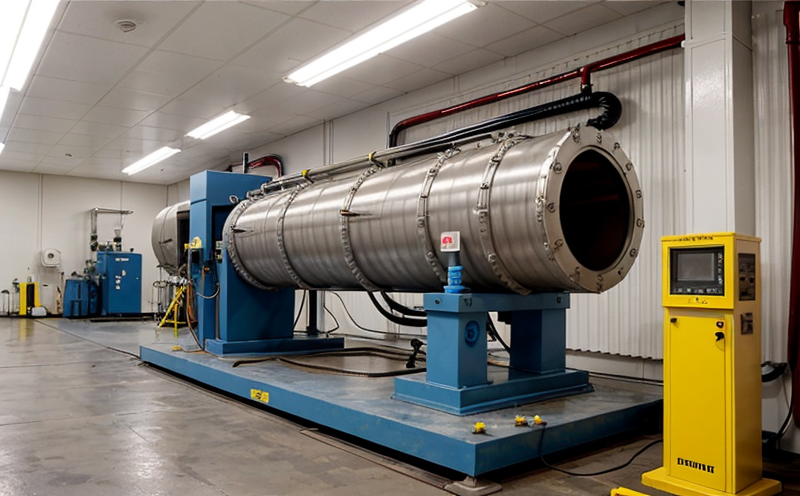ASTM C799 Isotopic Composition of Uranium by Mass Spectrometry
The ASTM C799 standard is a critical method used to determine the isotopic composition of uranium through mass spectrometric analysis. This service plays a pivotal role in ensuring that nuclear fuel and materials meet stringent quality control standards, compliance with regulatory requirements, and performance expectations.
Uranium, as a key fissile material in nuclear technology, comes in various isotopes—chiefly 235U (uranium-235) and 238U (uranium-238). The proportion of these isotopes is crucial for the safe and efficient operation of nuclear reactors. ASTM C799 provides a precise means to measure this ratio, which influences the reactor's efficiency and safety.
The process involves the following steps:
- Sample Preparation: Uranium samples are prepared according to specific protocols ensuring no contamination or alteration of isotopic content.
- Sample Introduction: The prepared uranium sample is introduced into a mass spectrometer, where it undergoes ionization and acceleration through an electric field.
- Spectrometric Analysis: The ions are then separated based on their mass-to-charge ratio using magnetic or electric fields. This separation allows for the accurate identification of different isotopes of uranium.
- Data Interpretation: The intensities of the signals corresponding to each isotope provide a direct measure of their relative abundances in the sample.
The precision and accuracy of ASTM C799 are paramount, especially considering its role in nuclear fuel production. This test ensures that reactor-grade uranium has an appropriate isotopic composition for safe and efficient operation. Deviations from standard ratios can lead to operational inefficiencies or safety hazards.
In summary, ASTM C799 is essential for maintaining the integrity of nuclear fuel, ensuring compliance with international standards like IAEA (International Atomic Energy Agency) guidelines, and supporting R&D efforts aimed at improving reactor performance and safety. This service is indispensable for quality managers, compliance officers, R&D engineers, and procurement professionals involved in nuclear technology.
Benefits
The benefits of ASTM C799 Isotopic Composition testing extend across various aspects, including regulatory compliance, operational efficiency, and safety. Regulatory bodies like the IAEA mandate this test to ensure that nuclear materials meet international standards, thereby reducing the risk of proliferation.
Operational efficiency is significantly enhanced as accurate isotopic composition ensures optimized fuel performance in reactors. This precision reduces wastage and extends the lifespan of reactor cores by ensuring they operate within specified parameters.
In terms of safety, ASTM C799 plays a crucial role by identifying potential hazards early on. By ensuring that nuclear materials are free from impurities or incorrect isotopic composition, this test helps prevent accidents and incidents that could compromise public safety.
For R&D teams, the data generated from ASTM C799 is invaluable for developing new technologies and improving existing processes in nuclear fuel production. This service also supports procurement efforts by ensuring that suppliers meet stringent quality standards.
Why Choose This Test
- Precision and Accuracy: ASTM C799 provides highly accurate results, which are essential for maintaining the integrity of nuclear fuel.
- Regulatory Compliance: Ensures that all materials meet international standards like those set by the IAEA.
- Safety Assurance: Identifies potential hazards early on, thereby enhancing operational safety.
- Efficiency and Performance: Optimizes reactor performance and reduces wastage.
- Data Quality: Provides reliable data for R&D purposes, helping to advance nuclear technology.
- Cost-Effectiveness: By ensuring materials meet specifications, this test can save costs associated with reprocessing or scrapping non-compliant fuel.
The reliability and precision of ASTM C799 are unmatched, making it an essential tool for quality assurance in nuclear fuel production. This service ensures that every aspect of the process adheres to the highest standards, thereby contributing to the overall success of nuclear technology applications.
International Acceptance and Recognition
The ASTM C799 standard is widely recognized and accepted by regulatory bodies worldwide, including the International Atomic Energy Agency (IAEA) and various national standards organizations. This broad acceptance underscores its importance in ensuring the quality of nuclear fuel.
Adherence to this standard ensures that nuclear materials meet stringent international requirements, thereby fostering trust among stakeholders involved in nuclear technology. The widespread adoption by regulatory bodies and industry leaders emphasizes the reliability and validity of ASTM C799 results.
The use of this method is not limited to a single country or region but is applied globally across various nuclear facilities. This global recognition enhances the interoperability of nuclear fuel, allowing for seamless collaboration between different entities involved in nuclear technology.
By aligning with international standards like ASTM C799, laboratories and testing facilities demonstrate their commitment to excellence and compliance. This alignment not only boosts credibility but also facilitates smoother interactions within the international nuclear community.





